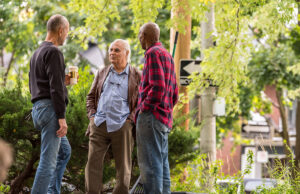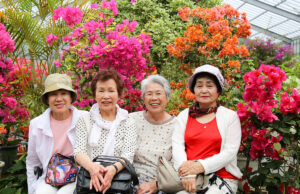Building a Socially Connected Age-Friendly City
Photo: (Left to right) Gregor Rae, Colin Williams and Steve Ordahl
By Shannon Davis
At the LeadingAge conference in New Orleans, Louisiana this past October, three panelists came together to present a global example of how to build a socially connected age-friendly future. Steve Ordahl, Vice President at Ecumen; Gregor Rae, Founder of ActiveAge; and Colin Williams, Director of Transformation, Adult & Culture Services at Newcastle City Council, recognized the need for age-friendly design and social-connectedness in their communities and discussed the key domains of age-friendly design that aims to reconstruct social and physical environments to foster more community engagement and interaction.
The age-friendly community concept is one in which older adults encounter a welcoming attitude from policy makers, service providers, and the general population. The presentation highlighted the global ageing demographic and noted that by 2050, there will be more people over the age of 65 than under 15 years of age. Further, 70% of the world’s population will live in urban environments.
The movement to make cities more age-friendly is not a new one. Nearly 300 municipalities around the world are participating in the Global Network of Age-Friendly Cities and Communities of the World Health Organization. Mr. Rae highlighted the example of Toyama, Japan as an age-friendly city. Toyama has a population of over 420,000 in which 30% of the population will be 65 years old by 2025. Toyama is a sprawling area and reinvented itself to become a vibrant city center with easily accessible amenities and services for the ageing population.
A new initiative, Vitalocity!, was developed in 2011 to help plan for sustainable environments that are socially and economically vibrant and encourages the integration and the well-being of people of all ages and stages in life. Over the past few years, a team of experts in senior living joined forces to make communities more age-friendly and to focus on addressing the challenges of social isolation and inadequate care. Mr. Ordahl noted that, “being age-friendly cannot be separated from other things in the city. Social isolation is an acute problem and it is our responsibility to engage all people.” The initiative was launched in the midst of a vibrant “hip area” of Apple Valley, Minnesota and focuses on a multi-generational approach.
Since the founding of Vitalocity!, other international entities of all sizes have joined the consortium and succeeded in implementing age-friendly communities. In Newcastle, the community reexamined its structure to adapt to the age-friendly community. Newcastle has undergone a renaissance, becoming a core city in the United Kingdom with a diverse and growing economy that contributes $20 billion to the economy. Newcastle is an ageing city in which the number of people aged 75-84 will increase by almost 60 percent over the next 20 years. The Newcastle Way Life Course recognizes that “older people are a major asset to our city (Newcastle) and to our society as a whole.” Further, the Newcastle Way Life Course teaches all of us the importance of recognizing that each of us has a personal history that makes us who we are, at whatever stage of life, something that the global ageing community should emulate to create an age-friendly community. Newcastle has connected the public and building experts to design homes for the future that include innovations in prefabrication, flexible living materials, and digital and low energy technology to provide supportive homes for everyone, at any stage of life.
The session closed with the emphasis on continual learning from one another around the world so that seniors can safely and comfortably engage in civic life which leads to a city’s enrichment.

Recently Added
February 19, 2026
Statement to the United Nations: February 2026
January 22, 2026




